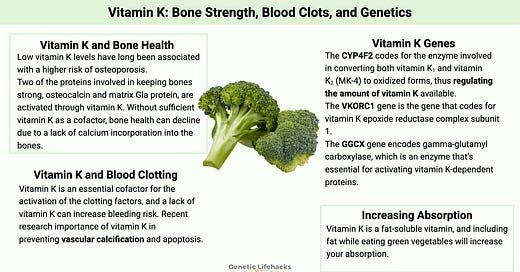New Genetic Lifehacks articles:
C15:0 Pentadecanoic Acid: Dietary Sources and Supplement Options
C15:0, or pentadecanoic acid, is an odd-chain saturated fatty acid that has been making headlines as a possible healthspan or longevity supplement. Higher dietary intake of C15:0 is linked to a 36% lower risk of mortality. Increasing intake also correlates to a lower risk of diabetes and cardiovascular disease. In this new article, I take a deep dive into how C15:0 is made in the body, which foods contain it, how to increase gut microbiome precursors, and what the studies on C15 supplements show.
Quick note: I cross-posted the C15 article on Longevity Lifehacks this week, so if you are a subscriber there, you've already read the article.
Vitamin K: Bone Strength, Blood Clots, Calcification, and Genetics
This vastly updated and expanded article explains how vitamin K is used by the body and why it is important in long-term health. Vitamin K is a cofactor that is essential in blood clotting, as well as a cofactor in processes involved in calcium deposition into bones or calcification of arteries and heart valves. Genetic variants related to lower vitamin K are linked to an increased risk of vascular dementia, osteoporosis, and aortic calcification. Should you take a vitamin K supplement? Understanding your genetic variants and checking your dietary intake can help you determine whether you need more vitamin K.
AI-Generated Journal Articles
In researching the last two articles, I came across a couple of recently published papers that had me questioning my understanding of the topics. They contained information that didn't quite fit with what I thought I knew - just odd enough for me to question whether I was right or if the published journal paper was right. So I checked the references, which didn't match up to what was in the paper, and then did a little more digging on the topics. It turns out that both papers were likely 100% AI-generated.
So I wanted to share a link to an AI detector with all of you in case you're questioning whether what you're reading is really a peer-reviewed, high-quality academic paper - or just AI-generated stuff that is likely about 75% correct. I'm not anti-AI, but I've used all of the current models and found that they all generate erroneous information in their writing. I've also found many errors when using AI overviews of papers. (Google now offers this on academic papers, which can be a great starting point. But always read the full paper to make sure the details are correct.)
What I've been reading:
1) Vitamin K2 in Managing Nocturnal Leg Cramps
This new study looks at the effects of supplementing with vitamin K for nighttime leg cramps in older people (avg. age 72). The results showed that vitamin K2 (menaquinone 7) at 180 μg/day for 8 weeks cut the frequency of leg cramps by more than half.
Why vitamin K? From the study: "Vitamin K causes myometrial relaxation by inhibiting calcium intake from the external medium, an action mediated by blocking the voltage-dependent calcium channels and thus attenuating intracellular calcium levels in muscle cells."
2) Exploring the association between dietary vitamin A and coronary artery disease risk in men and women: findings from a US population study
This study involving ~25,000 people found that higher daily vitamin A intake correlated to lower coronary artery disease, but only in women. The researchers think an interaction with estrogen explains the protective effect only in women.
Graphical overviews for the new article (for all the visual learners):






Interesting! I've been taking Vit K-2 for a few years after reading up on it. Also...thanks for the AI detector!